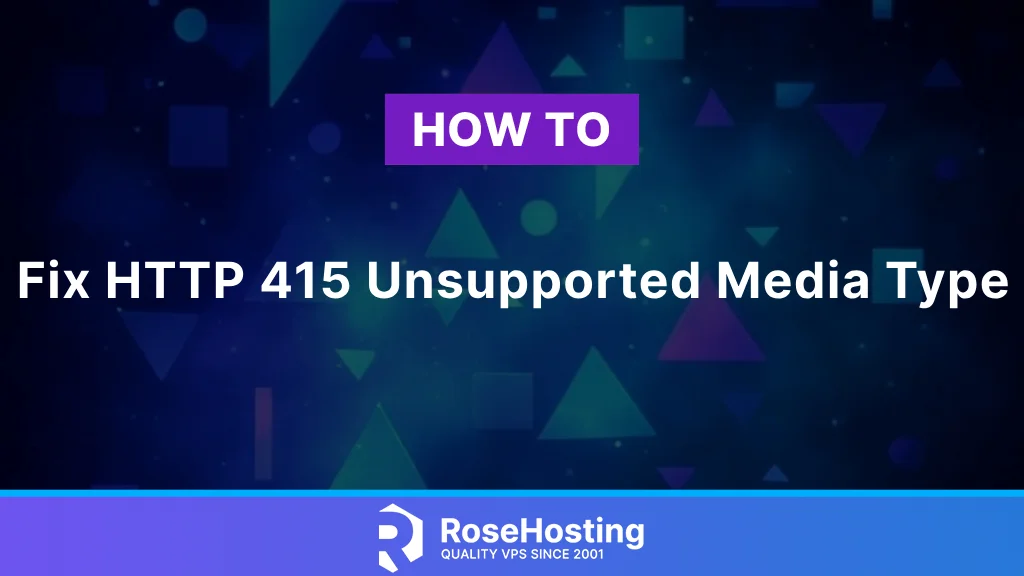
This blog post will explain the HTTP 415 Unsupported Media Type Error and how to fix it. The following error occurs when the server cannot serve the requested format by the client because the format isn’t supported. In other words, this is a mismatch between what the client’s browser sends and what the server is willing to accept. In the following paragraphs, we will discuss the HTTP 415 Error, its causes, and how it can be solved. Also, we will mention how this error impacts the website’s SEO. Naturally, we will explain how the content type and encoding headers work in more detail. Let’s get started!
Table of Contents
What is the HTTP 415 error?
The HTTP 415 Error stands for Unsupported Media Type. It occurs when the server refuses to accept the request because the data is in an unsupported format. The HTTP 415 error belongs to HTTP 4xx status codes, known as client errors. This means that requests contain bad syntax or cannot be fulfilled. The server understands the request from the client, even if the syntax is correct. However, the server cannot process the contained instructions or handle the specific media types sent by the client.
Since the error name is an unsupported media type, understanding the media type (MIME) is essential to fixing the error. The HTTP 415 Error usually appears when working with APIs where the server might enforce MIME types that it can process. If the server does not support some data, it will reject the requests, and the error will be thrown in the browser.
The next paragraph will tell us more about the causes of the HTTP 415 Unsupported Media Type error.
Why Does HTTP 415 Error Occur?
One of the most common causes of the HTTP 415 error is the incorrect content-type header. Usually, the content type header in the request is wrong due to a typo or non-standard media type that the server does not support. Another issue that can cause this is incorrect server configuration. The server might not be configured to accept some specific media types. Client-side issues are also one of the causes of the HTTP 415 error. On the client side, an incorrect Accept Header can also lead to an error in the browser.
Content-Type and Content-Encoding headers
The Content-Type header tells the server what’s inside the request before opening it. In the content type header, the media type of the resource is specified, such as:
Content-Type: text/html; charset=utf-8 Content-Type: text/css Content-Type: multipart/form-data; boundary=ExampleBoundaryString Content-Type: image/jpeg;
In contrast, Content-Encoding is a list of all the media’s encodings and how the file should be decoded to get the original data. Here are some examples of content encodings:
Content-Encoding: gzip Content-Encoding: br Content-Encoding: compress Content-Encoding: deflate Content-Encoding: zstd // Multiple, in the order in which they were applied Content-Encoding: deflate, gzip, compress
Understanding these headers is crucial. As the server owner, you know which header is causing your website to throw HTTP 415 in the browser.
How to Fix the HTTP 415 Error?
The HTTP 415 Unsupported Media Type Error can be resolved on a server level. We must ensure the server interprets, recognizes, and handles the Content-Type and Content-Encoding headers. Also, resolving the issue can be done on the client side by following the steps below:
Check the Content-Type and Content-Encoding headers in the request using the curl or some tools like Postman.
On a server, check the .htaccess file and see if the media types sent in the request are supported by the application by modifying the .htaccess
If necessary, make some changes in the code for your application to support and recognize new MIME types.
Check the Web Server configuration files and ensure your web server supports content-encoding formats such as mod_deflate or gzip.
The fix for this issue is to know what is sent in the request and what can be handled by the server. Everything that can not be handled should be configured on the server level to avoid issues in the subsequent request.
How HTTP 415 Impacts SEO?
The HTTP 415 Unsupported Media Type Error occurs when there is a mismatch between the request and the server due to an unsupported type, and the server can not give a response. However, this does not affect the website’s SEO. Here, SEO is not directly impacted, but the user experience and the website’s performance can impact it. So, the answer to the question is that HTTP 415 can impact SEO indirectly via the user experience.
Conclusion
These are the basic steps to fix the HTTP 415 Unsupported Media Type browser error. If the issue is server-related and you are unfamiliar with Linux, contact our technical support. All you need to do is sign up for our NVMe VPS server plans and submit a support ticket. We are available 24/7 via live chat and ticketing system and will gladly assist you.
If you liked this post about the HTTP 415 Unsupported Media Type status code and how to fix it, please share it with your friends or leave a comment below.